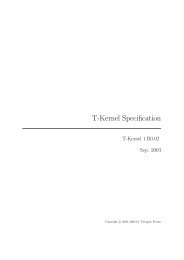[8] 2002 e-business-strategies-for-virtual-organizations
[8] 2002 e-business-strategies-for-virtual-organizations
[8] 2002 e-business-strategies-for-virtual-organizations
Create successful ePaper yourself
Turn your PDF publications into a flip-book with our unique Google optimized e-Paper software.
Developing knowledge-based <strong>strategies</strong> <strong>for</strong> a <strong>virtual</strong> organization<br />
The term core knowledge refers to the minimum required just to<br />
play the game and is commonly held by members of an<br />
industry. Advanced knowledge enables a firm to be competitively<br />
viable while innovative knowledge is that which<br />
allows an organization to move away from the pack and<br />
significantly differentiate itself from its competitors and even<br />
change the rules of the game. Since knowledge is dynamic, what<br />
is innovative today may well be the core <strong>for</strong> tomorrow.<br />
Competitive and strategic advantage is notoriously difficult to<br />
sustain, and this holds as true <strong>for</strong> knowledge-related issues as it<br />
does <strong>for</strong> purely technical advances such as improved engine<br />
design or the use of automated teller machines as a part of<br />
branch banking.<br />
At the operational level within the organization, knowledge<br />
needs to be defined and understood within the contexts of<br />
content, community and computing technologies.<br />
7.5.1 Knowledge content<br />
Content can be described and classified in a variety of ways:<br />
� tacit, explicit and meta;<br />
� procedural, declarative, causal, conditional and relational;<br />
� know-how/what/why/that/what was; and<br />
� symbolic, embodied, embrained, and encultured.<br />
Many definitions are given <strong>for</strong> these with frequent disagreements<br />
over terminology but <strong>for</strong> our purposes, explicit,<br />
procedural, know-what and know-how are readily identifiable<br />
and can be expressed in a recognizable range of <strong>for</strong>ms.<br />
We can capture, share and apply this knowledge.<br />
Tacit knowledge often takes the <strong>for</strong>m of a mental model and<br />
can be a mix of facts and perceptions typically answering the<br />
why/that issue. This is frequently encountered in the attitude<br />
expressed as ‘We do that because we have always done it that<br />
way, and it works.’ Tacit knowledge is often very hard to<br />
<strong>for</strong>malize and communicate to others and also may be an<br />
unacceptable answer to the ‘Why?’ question. But nevertheless<br />
this is a common attitude toward the existing and perceived<br />
knowledge within a certain community.<br />
7.5.2 Community knowledge<br />
We live and work at the intersection of several communities and<br />
take these <strong>for</strong> granted – we may identify with a family group, a<br />
149


![[8] 2002 e-business-strategies-for-virtual-organizations](https://img.yumpu.com/8167654/168/500x640/8-2002-e-business-strategies-for-virtual-organizations.jpg)












